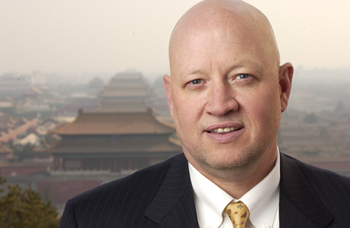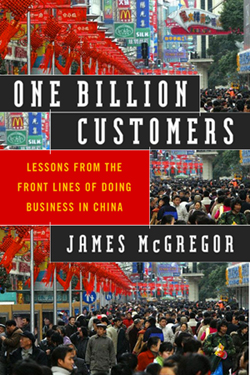The Asian Wall Street Journal, October 21, 2005
The Battle for China's Billion
By PAUL MOONEY in Beijing
In a posh Beijing restaurant, an American friend gushes over a slew of multimillion dollar deals that he is pursuing in China. I am tempted to remind the young entrepreneur that the road to doing business in China is littered with foreigners blinded by the potential of reaching over a billion consumers.
China's new fleet of hard-nosed businessmen turned starry-eyed optimists would benefit  from reading James McGregor's new book, "One Billion Customers: Lessons Learned from the Front Lines of Doing Business in China" (A Wall Street Journal Book published by Free Press, 312 pages, $27). Mr. McGregor, who has spent 15 years in China, first as the Wall Street Journal's China bureau chief, then as a businessman and entrepreneur, offers a well-written and sometimes humorous insiders' guide on how -- and how not to -- do business in China.
from reading James McGregor's new book, "One Billion Customers: Lessons Learned from the Front Lines of Doing Business in China" (A Wall Street Journal Book published by Free Press, 312 pages, $27). Mr. McGregor, who has spent 15 years in China, first as the Wall Street Journal's China bureau chief, then as a businessman and entrepreneur, offers a well-written and sometimes humorous insiders' guide on how -- and how not to -- do business in China.
The lessons come in the form of several case studies of ventures that either soared or crashed. Each chapter gives the details of a troubled venture in China, which is followed by a section entitled "What This Means for You," in which Mr. McGregor offers street-smarts on how the example can help the reader's business. Each chapter finishes with "The Little Red Book of Business," a pithy summary of Mr. McGregor's own observations.
Mr. McGregor tells the story of Morgan Stanley and the Construction Bank of China, who set up a joint venture Chinese investment bank. The chapter, aptly titled "Same Bed, Different Dreams," explains how both investors had a completely different view of what the venture was supposed to be. Neither side understood the other or made much of an attempt to resolve the differences.
Morgan Stanley's Jack Wadsworth is portrayed as a straight shooter who always says what's on his mind, unaware (or maybe he just doesn't care) of how he's offending his Chinese partners, who begin to secretly call him General Patton. Meanwhile, Wang Qishan, Mr. Wadsworth's Chinese counterpart in the venture, is a traditional Chinese businessman who avoids conflict and commitment by speaking in vague Chinese parables that drive his American partners crazy.
Even more interesting is the story of Lai Changxing's $6 billion smuggling operation, which shows how corruption is the lubricant that greases the wheels of commerce in China. Mr. Lai made his money by investing in developing relationships with police, customs officials and government officials. Mr. McGregor travels to Vancouver to meet Mr. Lai in person, and says that instead of the "sleazy, somewhat scary guy" he expected, Mr. Lai turns out to be "the nicest international fugitive you would ever want to meet." Mr. Lai professes his innocence, saying, "Now I see how dark the system is. I would have been better off to stay a vegetable farmer."
The book tackles larger issues as well, and argues that the Chinese Communist Party has a serious dilemma. It wants to root out corruption, but at the same time allows families of the ruling elite to  accumulate huge assets so that they can remain at the top of a country now dominated by business. "Everywhere one looks in China there are state-enterprise bosses and government officials sporting Armani suits, driving Mercedes or Audi luxury cars, and living in apartment buildings called Park Avenue, Palm Springs, or Beverly Hills. They golf at private clubs that charge $150 a round," he writes. "Many of them earn little more than $1,000 a month, but nobody asks about their assets and nobody tells."
accumulate huge assets so that they can remain at the top of a country now dominated by business. "Everywhere one looks in China there are state-enterprise bosses and government officials sporting Armani suits, driving Mercedes or Audi luxury cars, and living in apartment buildings called Park Avenue, Palm Springs, or Beverly Hills. They golf at private clubs that charge $150 a round," he writes. "Many of them earn little more than $1,000 a month, but nobody asks about their assets and nobody tells."
If somebody does speak out, the author continues, there is institutional impetus to cover up the accusations "because almost everybody is at least a little bit dirty." He advises readers that while big Chinese companies can operate above the muck because their deals are usually very large and visible, below this level "China becomes a swamp."
Mr. McGregor also challenges the conventional wisdom that potential investors should place major emphasis on guanxi, the Chinese word for connections or relationships, saying the oft-cited term is "overrated, temporary, nontransferable." He advises: "Never, ever put your business in the position where you are dependent on one individual for access to government officials."
Some of the best pearls of wisdom come from "The Little Red Book" section at the end of each chapter. At its core, Mr. McGregor writes, Chinese society is all about self-interest. It is very strong on competition but very weak on cooperation. In China, a conflict of interest is viewed as a competitive advantage. Deep scars from the Cultural Revolution and the upheaval of a sudden shift to getting rich has created an atmosphere in which nobody trusts anybody. In China business, the expectation is to be cheated.
The book's shortcoming is that like many books on doing business in China, Mr. McGregor focuses on the negative examples of how things went very wrong. While there are valuable lessons to be learned from the companies that floundered in China -- some of which eventually got it right -- readers would have also benefited from one or two positive examples of foreign companies that made the right decisions.
Mr. McGregor's book is based on solid reporting, hard research, grassroots legwork, and just a lot of personal experience of doing business in China. Any foreigner hoping to sell China a billion of anything would be well advised to pick up a copy and read it on the plane coming over.